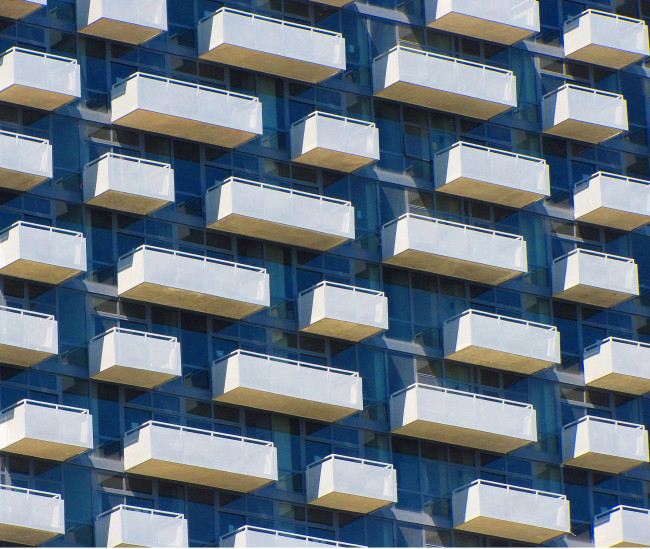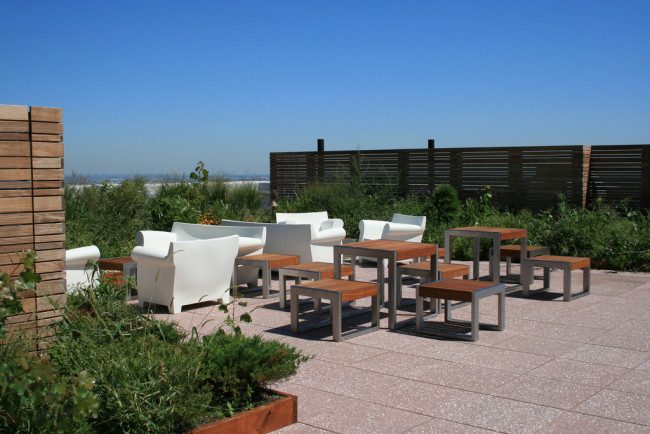In light of the Bushwick balcony collapse, how to stay safe this summer

As the weather heats up, New Yorkers lucky enough to have balconies and decks are taking to their outdoor spaces. We hate to be buzzkills, but unfortunately, mishaps sometimes do occur on these structures: Last night, Gothamist reports, a second-story deck collapsed in Bushwick, taking several people with it. The worst of the injuries seems to be broken bones, though in the past, people have been killed in similar accidents, including a woman who fell through an old terrace railing in 2013.
In this case, the deck was part of a historic property built in 1890; reportedly, dozens of revelers had gathered on the structure before it gave way. Given the preponderance of aging buildings in NYC, it's clearly worth ensuring that your balcony is sound, so what steps should you take?
For starters, take a look at this previous Brick article, which breaks down the potential sources of deck danger. As balconies and decks age, they require upkeep to maintain stability. The magazine and website This Old House outlines the indications that a wooden deck needs some maintenance, and this segment from Good Morning America describes the warning signs of an unstable balcony, which include wobbly guardrails.
ABC Breaking News | Latest News Videos
If you're hanging out on someone else's balcony, there's a simple measurement to determine whether it is dangerously packed. Larry Ubell, a structural engineer and president of Accurate Building Inspectors, was interviewed for the segment, and notes that if you are standing shoulder-to-shoulder with other people on a deck with little to no elbow space, the space is too crowded and may not be able to support all that weight—which sounds like a possible explanation for the Bushwick collapse. And, he also suggests checking a structure by gently rocking on it. "If you're on a deck, a balcony or a terrace and you swayback and forth and that moves with you, that's a real problem. Because it indicates it's a failure of the structural connections."
On the bright side, when reached by phone Ubell said that concrete balconies failing is highly unlikely: "In most cases, a concrete deck is an extension of floor plate and just as strong as the interior floor," he says. Wooden decks, on the other hand, account for most collapses. "Generally speaking, it's decks with poor water or drainage management, and the wood gets saturated with water and starts to rot," Ubell says. "Mold or bacteria keeps growing into the wood, and it fails."
If you have a wooden deck, Udell suggests looking underneath it to check for deformation of the wood; if you notice any, get it officially inspected. "If it's not smooth anymore on the outside, it's got a problem," he says. "Ripples in the wood or paint are telling you the interior of the wood has deteriorated and is no longer viable."
City law requires homeowners to keep their decks in safe condition; to help facilitate this, the Department of Buildings is offering free inspections to owners who request them until June 25. If a violation is found, there will be no penalty, but owners will be required to address the problem. Meanwhile, for renters, your landlord is the one on the hook for balcony safety, so if you suspect there's a problem, reach out to him or her. (And if your landlord is unresponsive, file a residential maintenance complaint with the city.)
It's also important to protect yourself from this kind of accident financially, as well as physically. Jeffrey Schneider, president of Gotham Brokerage (fyi, a Brick sponsor), notes that for both renters and owners, the personal liability portion of your apartment insurance will cover you if your deck collapses while guests are on it—assuming you're just holding a private gathering rather than a professional event. In the latter case, you would need to purchase special event insurance, which would protect you from being held responsibile for injuries or property damage.
"Of course, serious injuries might exceed your insurance coverage," Schneider says. "Just another reason why any structure, especially an old wood one, should be examined each season and kept up to code."
You Might Also Like




























